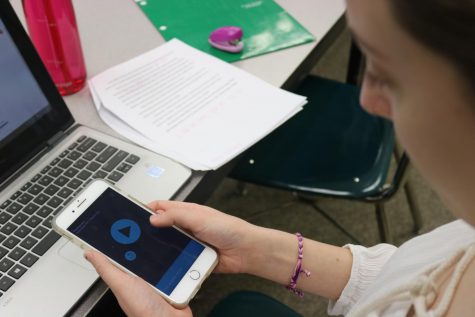Modern Meditation
Students Should Explore Practicing Mindfulness Through Meditation
February 27, 2018
The definition of mindfulness is open to interpretation and changes over time, but it always directly addresses being aware. Mindfulness is directly linked to meditation, the act of focusing your mind to achieve a mentally clarity by bringing awareness to the senses.
The roots of meditation come from Southeast Asia, specifically China and India, and have been practiced since as early as 1500 B.C.E. The earliest documented records of this practice come from the Vedas, a collection of religious texts and hymns stemming from India. Meditation was used as a spiritual and physical experience to bring focus through breathing and posture; this results in a sense of euphoria and an overall calming effect. Meditation spread from India to the world due to high traffic trade routes such as the Silk Road. Although meditation is an ancient practice, it is more popular than ever.
In an age where technology reigns and influences everything, even meditation has become digitized. Popular apps like Headspace and Buddhify have been created in order to make mindfulness easy and accessible; they achieve this by having personalized guided meditations for certain emotions or situations. These apps are narrated by different voices to provide diversity, so you can ease into solo meditation. Modern meditation encompasses the same ideals of the ancient practice, but is slightly modified. Before the age of technology, if someone wanted to learn the art of mindfulness they had to travel great lengths to places like Korea or Tibet. A vast amount of opportunities about meditation is at your fingertips due to technology, which ultimately led to its popularization over the past decade.
Over two years ago, I stumbled upon Buddhify in the app store and was utterly confused. I could not understand the purpose of mindfulness until I started to meditate. It is as simple as sitting down, attempting to clear your mind, and paying close attention to the breath. The amazing thing about meditation is that there is no wrong way; you listen to your body and go at your own pace.
I used Buddhify religiously for a year and learned a lot. When I stopped meditating for a couple months, I noticed differences in my everyday habits; I felt like my attention span and temper were shorter than ever. I have been on and off using Buddhify to mediate and I am noticing myself becoming more patient.
Although meditation has become trendy, it is not exactly mainstream. Many high schoolers simply are not aware of meditation, but should adopt the practice because of the beneficial effects. Meditation aids in learning focus and patience, provides a sense of tranquility, and is easily accessible.
Researchers in the Department of Psychological Research at University of California Santa Barbara examined this by subjecting undergraduate students to an intensive mindfulness program for two weeks. The study showed their memory capacity and attention span improved. The undergraduate students scored higher on a section from a reading comprehension test known as the Graduate Record Examination.
Procrastination is a common experience all students endure due to lack of focus. Meditation could aid in correcting this counterproductive habit. Learning to practice mindfulness takes a lot of focus and patience; these skills transfer over into everyday life. Increasing your attention span through meditation could help when students have to take long tests like the ACT. Often students attention span tapers off after a few hours, but meditation could be a game changer.
Focusing in on an emotion or breathing through meditation takes a lot of patience; learning patience is important for students. Patience helps in establishing mental clarity which aids in learning how to navigate academia and deal with stress. It is very difficult to excel when your brain is cluttered, and meditation helps people learn how to effectively access emotions and learn to cope. This is essential to students because school can become overwhelming due to constant inundation of information.
Many people have preconceived notions about meditation. They believe all you do is sit down and do nothing. However, it is an active form of brain training that helps to provide awareness, patience, and self examination. Students should meditate because of its relaxing nature and accessibility. Practicing meditation could help to improve test scores and ease academic related stress. In a world where everyone is in a rush, practicing modern mindfulness is important.







